The Memphis-Shelby County Schools board is finally approaching a consensus on reopening its stalled superintendent search to get more applicants in the pool.
The question now — a full month into a pause with no end in sight — is whether the district can attract more high-caliber candidates when its board is still struggling to define what it wants from its next superintendent.
“The relationship between the superintendent and the school board is maybe the most important job consideration for a superintendent,” said Jason Grissom, a professor of leadership, policy, and organizations at Vanderbilt University who has examined issues such as superintendent turnover.
The way a board conducts its search signals the board’s ability to “be on the same page, and to function successfully,” Grissom said. Without that, “some candidates may back away.”
The bigger risk, Grissom and others warn, is that continued discord among board members makes the job of the next superintendent more difficult and causes them to want to leave.
Turnover among superintendents is already high in urban districts. And MSCS, where most students aren’t reading at state benchmarks and where many struggle with poverty, can ill afford more instability at the top.
Process unraveled abruptly and publicly
District officials had promised the public a search process that would help restore trust and confidence in district leadership after the scandal that prompted former Superintendent Joris Ray to resign in August.
Instead, the search veered off course just as it was set to conclude, with some board members questioning the entire process and board policies after the outside search firm presented three top candidates. Board Chair Althea Greene declared a halt to the search and canceled planned interviews with the finalists.
Disagreement among school board members is common and can be a sign of a deliberative body fulfilling its duty rather than acting as a rubber stamp. “Democracy is sometimes ugly,” MSCS board member Kevin Woods acknowledged last month.
But the MSCS board’s disagreements have erupted unexpectedly and in public view, pointing to broader dysfunction.
The discussions and events since the April 15 meeting have turned up more signs the board had failed to coalesce on fundamental aspects of the search, even as it was in full swing. For example:
- Months after they approved a contract for the search firm — Hazard, Young, Attea and Associates — some members appeared to be unclear about what the firm was charged with doing, or what criteria it was using to evaluate candidates.
- Some members suggested that new steps be added to the search process that had been outlined to the public months earlier.
- The vice chair has been at odds with other members about whether to enforce a longstanding board policy that requires a superintendent to have 10 years of classroom or school leadership experience — a policy the search firm didn’t apply in screening applicants.
- The district barred several community activists who raised questions about board actions in the search and threatened them with arrest. MSCS said the bans followed “disruptive” behavior and threats to public safety.
- The board is poised to extend the selection timeline into the next school year after accelerating it in December for the purpose of having a new superintendent on duty by the summer.
A board retreat on Friday — featuring a meeting facilitator and an expert in school board operations — offered the first clear signs that MSCS board members acknowledge the need to start fresh with shared goals, rather than arguing about what has happened so far.
“You agreed on something … . You said status quo is not it,” said the facilitator, Tomeka Hart Wigginton, a former board member who led the superintendent search for Memphis City Schools in 2008.
Board member Stephanie Love, who is now co-chairing the search with Joyce Dorse-Coleman, pointed to Hart Wigginton as one of the reasons the board is moving forward and able to have “a more defined search process for greater community confidence and a better work environment for our next MSCS leader.”
As things stand, 26 candidates remain in the pool. But according to HYA, only three of the top seven candidates it identified are still interested: Carlton Jenkins, superintendent of schools in Madison, Wisconsin; Angela Whitelaw, the district’s chief academic officer; and Toni Williams, the interim superintendent. Another candidate who withdrew has since asked to re-enter the search, but it is unclear if she would be a possible finalist.
Two top contenders identified by HYA dropped out within days of the April 15 meeting: Brenda Cassellius, former superintendent of Boston Public Schools, withdrew after learning that the interviews were postponed, and later accepted a leadership role at a nonprofit. And Keith Miles Jr., superintendent of Bridgeton Public Schools in New Jersey, will become superintendent of the School District of Lancaster in Pennsylvania.
District’s reform efforts are on the line
Board members have signaled that they want more candidates to apply, and a new set of criteria to evaluate them. They plan to keep meeting until they can agree on their next steps and a revised timeline.
Whoever is selected will have to take on responsibility for a school reform effort that has been thrown off track by the pandemic and Ray’s resignation. And the district wants someone who will stay long enough to see it through.

But the odds are not in MSCS’ favor unless board members can find common ground. Grissom said research has shown that school board dysfunction is a predictor of superintendent turnover. And urban districts, with high numbers of low-income students and students of color, already struggle with greater turnover. Memphis has the nation’s fourth-highest child poverty rate among large cities, and nearly 90% of MSCS students are Black or Latino.
“Superintendents of urban districts stay in those jobs for less time than in other kinds of districts,” Grissom said. “It’s a hard job, and it’s a very political job, and so they have vacancies more frequently.”
In a 2021 RAND Corp. survey of 3,459 charter- and traditional-school superintendents, half said they planned to leave their jobs in the next few years, or were unsure about staying. ”Superintendent turnover can potentially harm district functioning in that it can disrupt longer-term and systemic school reforms, which typically take five or more years,” the report warned.
That finding points to more urgency for the MSCS board to resolve its differences and fix its selection process.
Questions about Williams’ candidacy lead to crackdown
One place to begin, Grissom said, is with more transparency and communication among board members and with the public.
Some board members, for example, said they asked for the entire list of applicants because they were in the dark about how the rubric was created for evaluating them, and because they didn’t know who the three finalists were until Hazard Young announced the choices publicly.
“We as a board did not decide as a whole on the criteria,” said Sheleah Harris, the vice chair.
Venita Doggett, director of advocacy for Memphis Education Fund and a member of a community advisory committee that was involved in the search, raised similar concerns.
“Not only were the advisory committee members not included or weren’t heard, it looks as if the board members who raised those concerns also weren’t heard,” she said.
Rebuilding public trust in the search process will likely be a heavy lift for MSCS.
Some community members and education advocates said they became skeptical of the process when Williams, who initially said she wasn’t interested in the permanent job, applied for it and emerged as a finalist, despite not having the minimum classroom experience required by board policy.
Williams said she applied for the role after receiving support from community members and board members.
When Rachael Spriggs, an education advocate and former school board candidate, questioned the board on that point at a May 9 meeting, she was silenced by Greene, the board chair, on the grounds that she violated a public commenting policy by referring to a district employee by name.
Spriggs soon found herself banned from entering district property, along with several others, including former teacher union president Tikeila Rucker, activist L.J. Abraham and, later, disability rights advocate Damon Morris. In a statement, MSCS said the bans followed “disruptive” behavior and threats to public safety.
Neither Greene nor MSCS personnel would say who authorized the bans. But the crackdown on several prominent critics — including police threats to arrest them if they enter any district buildings — has the board facing a fresh round of public criticism at the same time that it’s trying to reestablish trust and attract new superintendent candidates.
Public needs reassurance about the process
With the search effectively starting again, board members must be conscious of what they’re communicating to the public and candidates, Grissom said.
“They need to be real clear about any changes they’re making and why,” he said. “They must take seriously how a search can signal things to the candidates and to the public. It can signal to them what it may be like to work in this environment.”
Board members may have a good reason to, say, waive the experience requirements for a candidate like Williams, he said, but they must think about what that signals — especially for keeping top superintendent applicants in the hunt and building trust with the community.
“You can still get buy-in even if the public doesn’t get its first choice, but they feel the process was legitimate and everyone followed the rules,” he said.
That’s the reset some board members are seeking after the May 12 retreat, where they reached a consensus on reopening the search and seeking more applicants, as well as reworking the rubric for the job.
They hope to have a formal plan soon — nearly nine months after Ray resigned.
Bureau Chief Tonyaa Weathersbee oversees Chalkbeat Tennessee’s education coverage. Reach her at tweathersbee@chalkbeat.org.
Laura Testino covers Memphis-Shelby County Schools for Chalkbeat Tennessee. Reach Laura at LTestino@chalkbeat.org.

